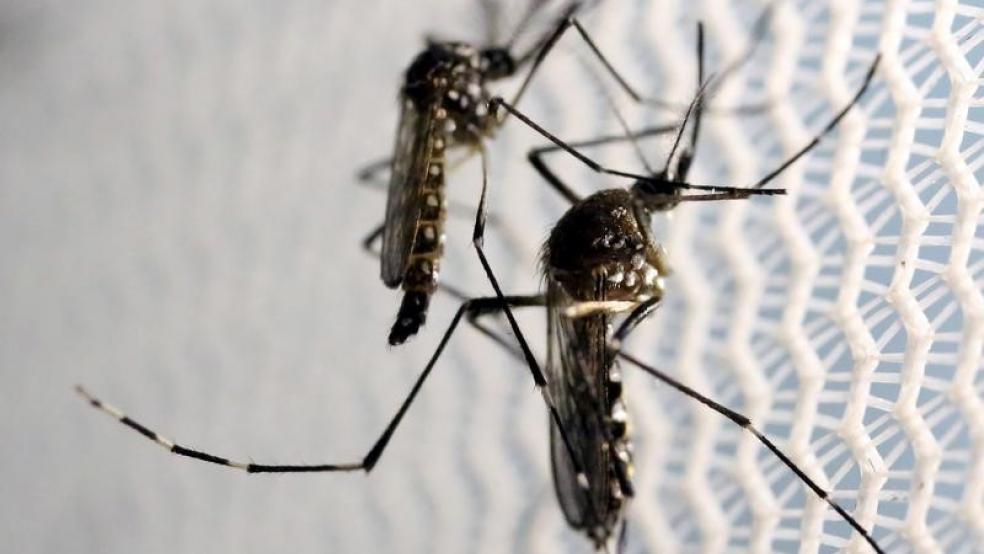Democratic presidential nominee Hillary Clinton intervened in the Zika virus crisis on Tuesday, joining Florida Gov. Rick Scott, a Republican, in urging Congress to cut short its all-too-long summer recess and pass a $1.1 billion spending bill to help combat the spread of the dreaded disease in the continental United States.
Florida officials yesterday announced four more cases of Floridians who likely contracted the mosquito-borne virus in the relatively small, one-square-mile Miami neighborhood of Wynwood, the only area in the country reporting active transmissions of the disease. That brought to 21 the number of cases of people who contracted the disease locally, rather than while traveling overseas or having sex with a carrier.
Related: The Senate Dithers Again as Zika Virus Continues to Spread
The disease, which is spread by mosquitoes, already has affected Brazil, other Latin American countries and Puerto Rico, and now threatens the United States.
There have been numerous cases of pregnant women developing microcephaly and giving birth to infants with grotesquely deformed heads. The Centers for Disease Control is monitoring roughly 280 pregnant women infected with Zika in the U.S., while Brazil has reported nearly 3,600 pregnant women with Zika since the start of the year. Others who have contracted the infection have suffered from high fevers, rashes, pink eye and Guillain-Barre syndrome, a dangerous temporary paralysis.
While Republican presidential nominee Donald Trump has generally downplayed the seriousness of the public health crisis, Clinton yesterday toured a Miami neighborhood health clinic near ground zero of the Zika outbreak and admonished lawmakers for having adjourned until after Labor Day without resolving a partisan impasse over the urgently needed spending bill.
“I am very disappointed that the Congress went on recess before actually agreeing on what they would do to put the resources into this fight,” Clinton told reporters gathered at the Borinquen Medical Center. “I would very much urge the leadership of Congress to call people back for a special session and get a bill passed.”
Last weekend, Scott sharply criticized the federal government and lawmakers for dragging their feet in providing resources needed to combat the disease, including 10,000 Zika preparedness kits, mosquito spray and additional manpower to root out the mosquitoes. “We still need the federal government to show up,” Scott said during an appearance on NBC’s Meet the Press. “The President and Congress have to work together. This is a national, international issue. It’s not just a Florida issue.”
Related: U.S. lawmakers deadlock on Zika virus funds
There is currently no vaccine or treatment for the Zika virus, although federal and military research and studies are underway. However, Dr. Anthony Fauci, director of the National Institute of Allergy and Infectious Diseases, has warned that without adequate new funding, a larger Zika study being planned for 2017 will dramatically slow down.
If Clinton and Florida state and local officials are counting on a mid-summer response from a slumbering Congress, they are in for a disappointment. House Speaker Paul Ryan (R-WI) and Senate Majority Leader Mitch McConnell (R-KY) have signaled a willingness to return before Sept. 6, but only if Democrats drop their objections to the Republican-crafted bill.
But Senate Minority Leader Harry Reid of Nevada and other Democratic leaders say the bill is unacceptable in its present form, including a ban on federal funding for Planned Parenthood in Puerto Rico, a U.S. territory in the Caribbean that has reported nearly 2,000 cases of Zika infection.
Norman Ornstein, a political scientist at the American Enterprise Institute who has written widely on congressional gridlock, said that there is no excuse for lawmakers’ failure to act. He said the impasse highlights what has become “an utterly dysfunctional legislative process.”
Related: The US Military Has Declared War on the Zika Virus
Congress's failure to resolve the Zika funding impasse may reflect a larger political reality: Most Americans just don’t care about it or else feel they are safe from the possible spread of the disease.
A new Washington Post-ABC News poll found that 65 percent of Americans say they are not worried that either they or a member of their immediate family will become infected with the Zika virus. Just over a third of those surveyed said they were at least somewhat worried, while only 12 percent said they were “very worried” about infection.
The poll only found elevated anxiety levels about Zika in Florida and Texas, where 43 percent of residents are “very” or somewhat worried. However, throughout the rest of the country, fear about the Zika virus is far less than what it was about the outbreak of the Ebola virus in 2014 or the swine flu epidemic in 2009, according to a Washington Post analysis.
Related: How to Protect Yourself From the Zika Virus
What’s more, a recent STAT Harvard survey found that only 44 percent of Americans interviewed were aware that Congress left town without passing the funding bill.
For most Americans, when it comes to Zika, it’s a case of out of sight, out of mind. Moreover, if their constituents are largely indifferent to the brewing public health crisis, there is little incentive for members of Congress to cut short their vacations and return to Washington to take long-overdue action.





